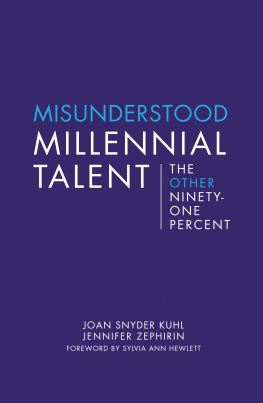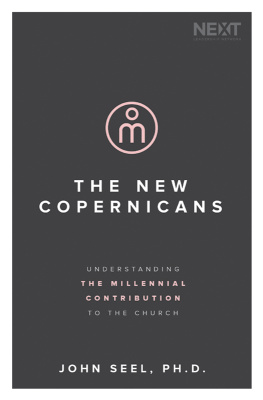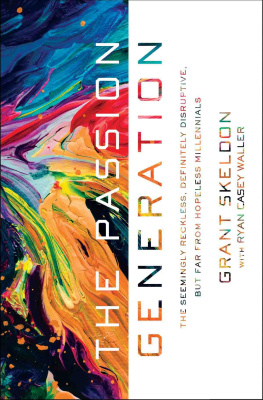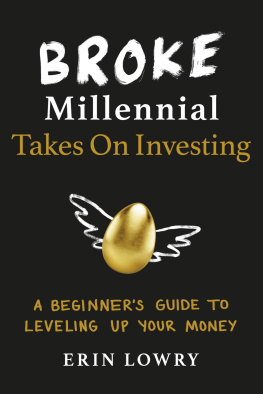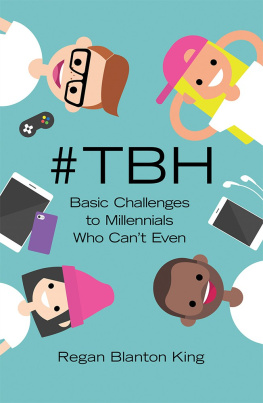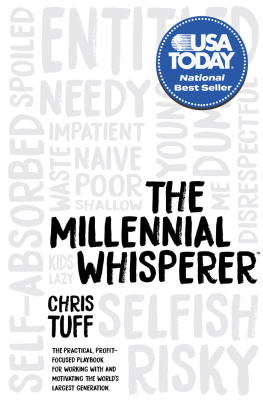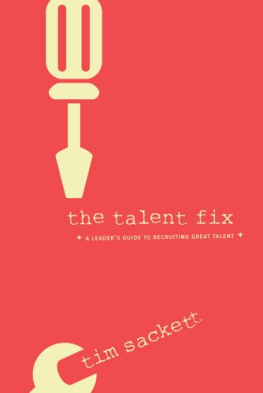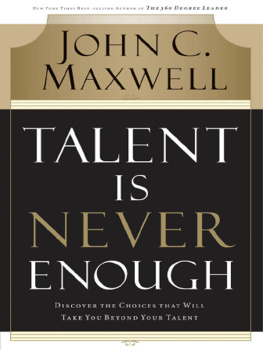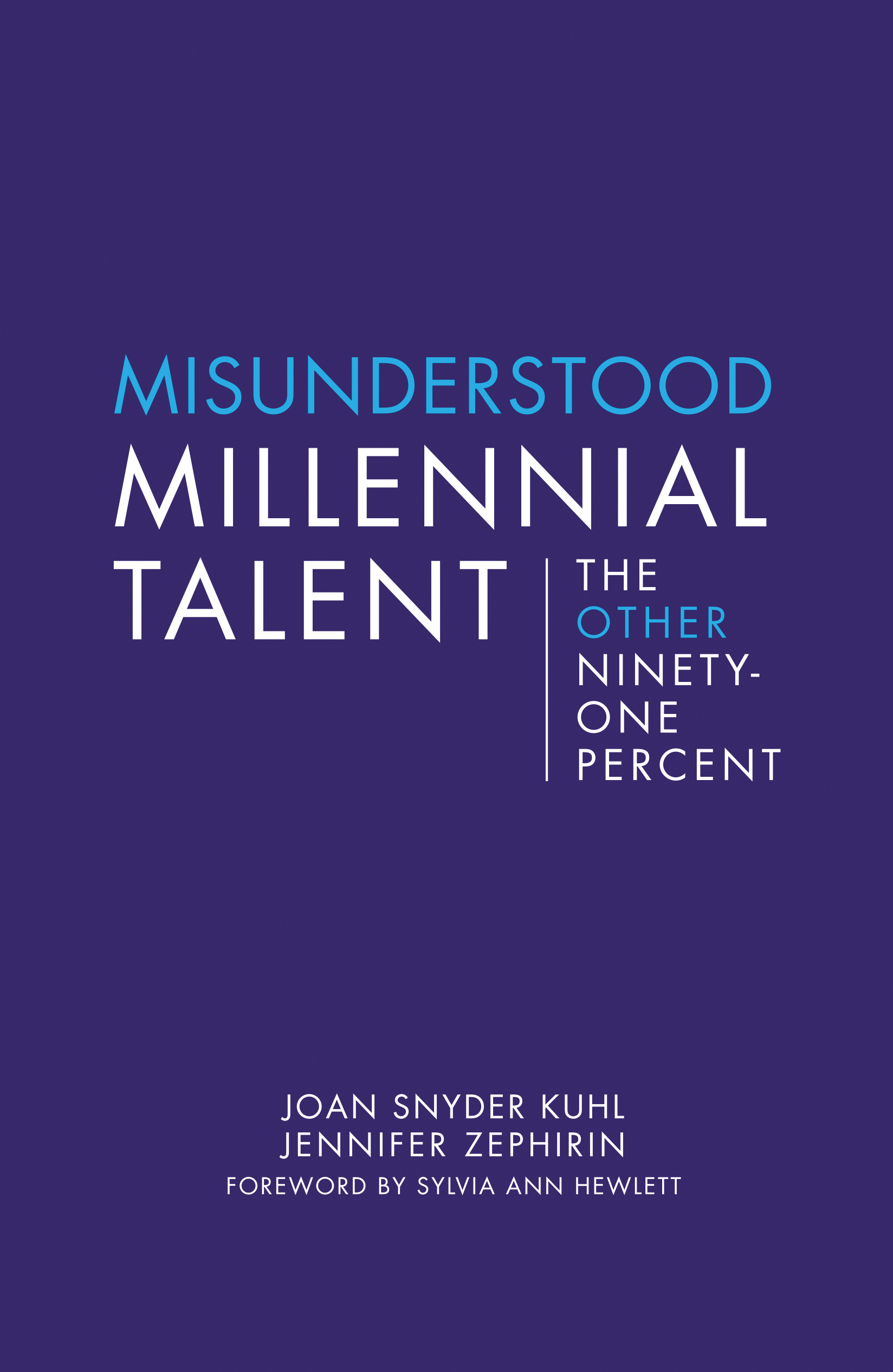A dvance Praise
Millennial talent experts Joan Snyder Kuhl and Jennifer Zephirin tackle this thorny issue with much-needed clarity and finesse. Through compelling research, stories, and narrative, Misunderstood Millennial Talent provides an invaluable look into what the invisible majority of Millennialsthe Ninety-One Percentreally need and want. An essential read that belongs on the desk of every leader as the people agenda and Millennials have to be the focus of every leader.
Kirk Kinsell, CEO and President of
Loews Hotels and Resorts
An enjoyable and insightful read that provides up-to-the-minute practical advice, whether youre already seeing an increasing shift in Millennials to management roles or looking to increase awareness about managing them and attracting more young talent to your company. Kuhl and Zephirin focus on the most pressing issuesand cogent solutionsfor global employers looking to the future of their workforce and leadership.
Steve Fry, SVP, Human Resources and Diversity,
Eli Lilly and Company



This is a Center for Talent Innovation Publication
A Vireo Book | Rare Bird Books
453 South Spring Street, Suite 302
Los Angeles, CA 90013
rarebirdbooks.com
Copyright 2016 by Center for Talent Innovation
All rights reserved, including the right to reproduce this book or portions thereof in any form whatsoever, including but not limited to print, audio, and electronic. For more information, address:
A Vireo Book | Rare Bird Books Subsidiary Rights Department,
453 South Spring Street, Suite 302, Los Angeles, CA 90013.
Set in Minion
ePub ISBN: 978-1-945572-13-5
Publishers Cataloging-in-Publication data
Names: Kuhl, Joan Snyder, author. | Zephirin, Jennifer, author.
Title: Misunderstood Millennial talent : the other ninety-one percent / Joan Snyder Kuhl ; Jennifer Zephirin ; foreword by Sylvia Ann Hewlett.
Series: Center for Talent Innovation.
Description: First trade paperback original edition. | A Vireo Book. | New York [New York] ; Los Angeles [California] : Rare Bird Books, 2016. | Includes bibliographical references and index.
Identifiers: ISBN 9781942600992
Subjects: LCSH Generation YEmployment. | Generation YAttitudes. | Organizational behavior.| Success in business. | Intergenerational relations. | Work ethic. | Globalization. | BISAC BUSINESS & ECONOMICS / Workplace Culture | BUSINESS & ECONOMICS / Organizational Development.
Classification: LCC HF5549.K84 2016 | DDC 658.3dc23
To the amazing thought leaders who have been at the heart of this research:
Linda Hartman-Reehl
Barbara Keen
Rosemarie Lanard
Frances G. Laserson
Nancy Testa
Karyn Twaronite
P roject Team
P roject Lead
S ylvia Ann Hewlett, Founder and CEO
Q uantitative Research
L aura Sherbin, CFO and Director of Research
P ooja Jain-Link, Senior Research Associate
C harlene Thrope, Research Associate
Q ualitative Research
M elinda Marshall, EVP and Director of Publications
A nna Weerasinghe, Fellow
P roduction
D eidra Mascoll, Senior Research Associate
I sis Fabian, Research Associate
C atherine Chapman, Research Associate
C ommunications
T ai Wingfield, SVP and Director of Communications
S ilvia Marte, Communications Associate
C ontents
China
F oreword
W hen I arrived at Cambridge University as an eighteen-year-old freshman, I saw opportunity unfurl at my feet like a red carpet. In the late 1960s, barriers to higher education were falling, and women and minorities were stampeding the gates of the professions, no longer content to be secretaries and clerks. It felt to me that in this brave new world, nothing could trip me upneither my gender nor my modest background. I could not have been more wrong.
My first term as a student at Cambridge University was rough, and, as it turned out, my problems had much more to do with class than gender. I had grown up in a working class family in the coal mining valleys of South Wales and spoke English with a thick Welsh accent. My classmates at Cambridge, on the other hand, had attended elite private schools (Eton, Harrow, Cheltenham Ladies) and spoke impeccable Queens English.
In class-conscious England, my South Wales accent indicated I was from the lower echelons of society. I dropped my aitches, talked about our mam, and said ta instead of thank you. Back in the 1970s, these colloquialisms were not regarded as charming or cute. Indeed, my first week at Cambridge I overheard my tutor describe me to a colleague as uncoutha memory that still makes me wince.
At bottom, my accent signaled that I was uneducated or ill-bred (to use a particularly demeaning English term). And in a sense I was. At age eighteen, my main extracurricular activities were child minding (I had five younger sisters) and cooking (it was my responsibility to whip up the family evening meal). I had very little knowledge of the world. My father occasionally brought home a local tabloid called the Western Mail but didnt see the point of spending hard-earned money on buying a national newspaper, so I knew next to nothing about current affairs. Our household boasted a motley collection of nineteenth-century novels, courtesy of my mother, who loved the Bront sisters, but outside of that I was not well-read. Id never been to the theater, shopped at a high-end store, or traveled abroad. We spent family vacations in a trailer park in West Wales. As a result, I had no small-talk skills or cocktail patter. It wasnt a personality thingI was friendly and outgoing. I was tonguetied because I didnt have anything to talk about in my new milieu. I had no way of joining in conversations about, for instance, the Tory leadership struggle, the skiing season in Austria, or the latest in bell-bottom jeans. I had spent the summer before college working in the local municipal laundry rolling hospital sheets. Hardly the stuff of Cambridge small talk!
My fellow students werent openly rude or hostileafter all, they were well-bred young peoplebut they kept their distance. I wasnt on the invitation lists for sought-after freshman parties, and I found it impossible to penetrate the cozy circles that dominated the interesting clubs. I remember being the awkward, ignored outsider at the Cambridge Union, the university-wide debating society.
I soon realized that to survive and thrive I needed to strip myself of my accent and lose the most obvious of the class markers that set me apart from my peers. By January of that first year I had embarked on a transformation. I started with voice and speechwhich were, after all, how I betrayed my background. I couldnt afford elocution lessons or a voice coach, so I bought a tape recorder and spent long hours listening to, and then attempting to copy, the plummy voices on BBC Radio. I favored newscasters on the BBC World Service since they spoke a particularly clear and neutral form of the Queens English. It took at least two years, but eventually I nailed it. In addition to fixing my accent, I set about elevating my conversation so that it reflected the caliber of my thinking rather than my class status. I subscribed to the Guardian and the Times Literary Supplement , and bought cheap tickets to the local arts theater. By the time I graduated I was trying out my newfound cultural and political fluency on a slowly expanding circle of more sophisticated friends.

